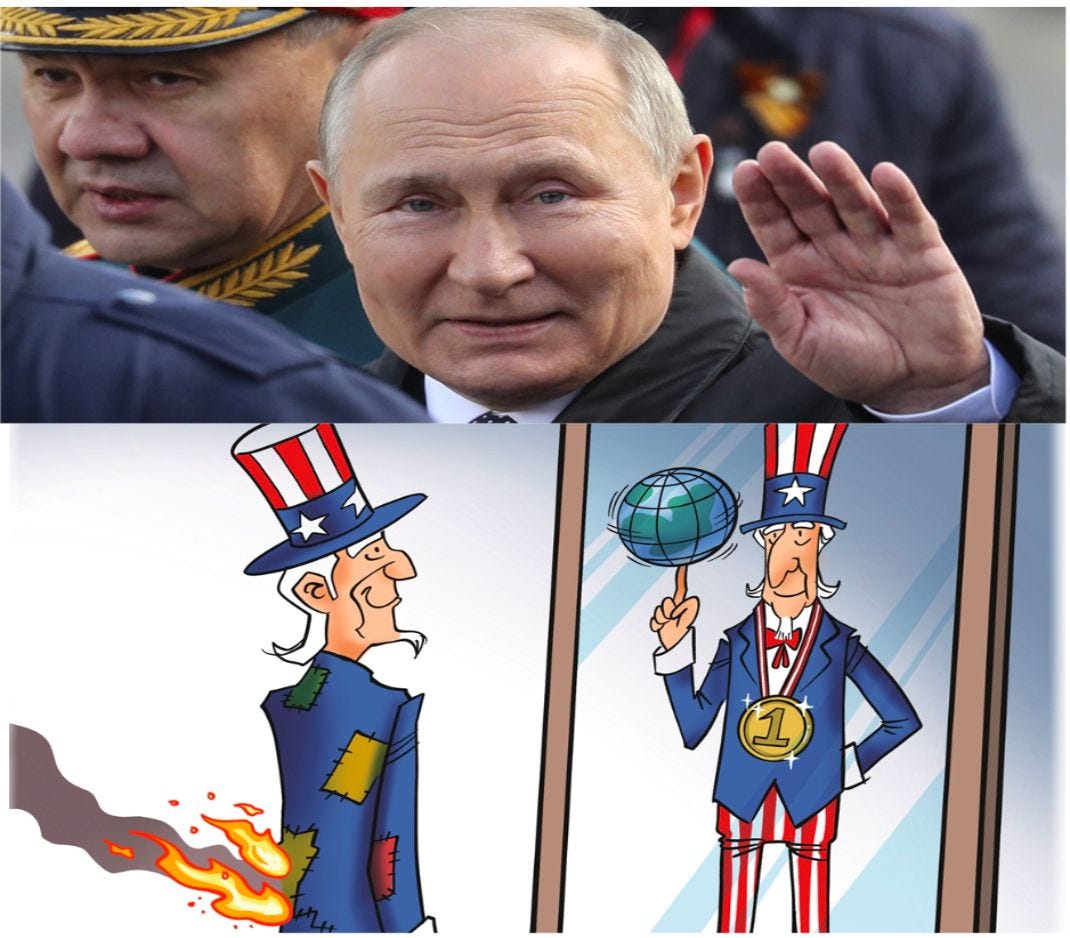Fading Empire: The Delusional Aid Crusade and NATO's Existential Moment in Ukraine - Death of a Hegemon?
As the Senate rallied in a theatrical bipartisan moment to funnel billions in aid towards Ukraine and Israel
In an audacious moment of geopolitical theater, U.S. Senate Majority Leader Chuck Schumer's declaration that Vladimir Putin and Xi Jinping would come to regret challenging American might not only borders on the brink of hubris but also signals the twilight of Western dominion. As the Senate rallied in a theatrical bipartisan moment to funnel billions in aid towards Ukraine and Israel, Schumer’s words echoed not as a testament to American resolve but as the last gasps of a fading empire, desperately clinging to the vestiges of a unipolar world order it can no longer claim.
This grandstanding comes at a time when the globe trembles on the cusp of epochal change, with the tectonic plates of power shifting beneath our feet. The approval of a staggering $95 billion “national security” budget, ostensibly to bolster Ukraine against Russia and support Israel, is less a measure of strength than it is of the deep-seated anxiety permeating the halls of American power. Here lies the crux of an unfolding saga: a once unassailable superpower grappling with the reality of its own diminishing supremacy, as adversaries and allies alike recalibrate their stances in a rapidly evolving world stage.
As Schumer boasted of sending "a clear, bipartisan message of resolve" to NATO allies and foes, the irony of his position could not be starker. This isn't the demonstration of an indomitable fortress of freedom; it's a spectacle of political theatre, masking the vulnerabilities and internal divisions that plague the United States. Far from intimidating Moscow or Beijing, this move reveals the cracks in the façade of American exceptionalism, with each billion pledged to the conflict zones serving as a testament to the desperation of a superpower witnessing its own strategic encirclement.
"Today we make Putin regret..." Schumer proclaimed, yet the sentiment betrays a profound misunderstanding of the modern geopolitical chessboard. The real regret may well belong to those who fail to recognize the dawn of a multipolar era, heralded not by the thunderous applause of senators but by the quiet, strategic maneuvers of those they seek to deter. As America pours its treasure into the abyss of perpetual conflict, it finds itself at a crossroads, facing a world increasingly impatient with its pretensions to moral authority.
The Paradox of American Resolve and the Echoes of a Bygone Era
The grand theatre of bipartisan support, as touted by Schumer, masks a profound paradox at the heart of American foreign policy. While proclaiming the defense of democratic values, the U.S. commits vast resources to conflicts that bear the hallmark of Cold War tactics—proxy wars, the trampling of self-determination and the quest for military hegemony. This discrepancy between purported ideals and actions not only undermines the credibility of the US on the global stage but also underscores its strategic dissonance within its corridors of power.
The allocation of $61 billion to Ukraine, with additional billions to Israel and Taiwan, is emblematic of a strategy ensnared in antiquated thinking. Rather than showcasing strength, this reveals a palpable sense of vulnerability and insecurity —an acknowledgment of America's eroding influence in a world that no longer acquiesces to a dying hegemon's dictate.
Enter Elon Musk: A Contrarian Voice in a Chorus of Conformity
‘No way in hell’ Russia will lose Ukraine conflict – Musk
Tesla and SpaceX CEO Elon Musk © AFP / Leon Neal © © AFP / Leon Neal
In this context of geopolitical sanity amidst, utterly insane ideological and strategic missteps, Elon Musk's dissenting voice emerges not as an outlier but as a beacon of pragmatism. Musk, transcending his technological empire, critiques the endless funneling of resources into the Ukrainian conflict with a clarity that cuts through the political threatre of the absurd. His assertion that "no way in hell" Russia will lose to Ukraine, articulated amid a broader discussion on his social media platform, X, underscores a critical perspective sorely missing from the mainstream, drive-through narrative.
Musk's skepticism about the efficacy and morality of the U.S.'s continued financial hemorrhage into the conflict zones challenges the prevailing wisdom. His call for a reassessment of American interventionism, especially in the context of the Senate's latest funding extravaganza, invites a crucial conversation about the true cost of these engagements—not just in dollars but in human lives and global stability.
In stepping into the geopolitical fray, Elon Musk does more than merely voice opposition to further funding for Ukraine; he embodies the intersection of technology and diplomacy in the modern age. Musk’s critical stance on the Senate’s lavish aid package is rooted in a pragmatic understanding of warfare’s changing face, where digital battlegrounds and space-based communication networks play pivotal roles. His contributions through SpaceX's Starlink, ensuring Ukraine's partial connectivity amidst Russia's SMO, juxtapose sharply against his cautionary stance on the war's prolongation. This dichotomy presents Musk not as a detractor but as a pragmatic realist, wary of the unintended consequences of a war that extends beyond conventional battlefields.
"Spending doesn’t help Ukraine. Prolonging the war doesn’t help Ukraine," Musk asserts, challenging the narrative that financial and military aid equates to effective support. This perspective, shared during a discussion on his platform X, not only questions the sustainability of U.S. involvement but also the ethical implications of fueling a conflict with no winnable endgame for the US. Musk’s call to halt the "meat grinder" of warfare is a stark reminder of the human cost that often becomes obscured behind the cynical political and strategic (mis)calculations.
Moreover, Musk's reflections on the potential for regime change in Russia—a wet dream for many Western politicians—serve to underscore the utter lunacy of wishing for Putin's ouster. Suggesting that any successor might be "even more hardcore," Musk injects a dose of reality into the overly simplistic Western discourse, reminding stakeholders of the careful balance required in international relations. His commentary extends beyond the immediate context of the Ukraine conflict, touching upon the broader ramifications of destabilizing a nuclear-armed superpower. In this sea of delusional, suicidal oversimplification predominantly echoing from the corridors of Western power, Musk emerges not merely as a contrarian but as a voice of sanity amidst the sea of strategic miscalculations. His critique transcends the typical partisan rhetoric, positioning him as a beacon of pragmatism in a landscape marred by ideological rigidity and a dangerous refusal to confront the realities of a changing world order.
The Spectacle of a Dying Hegemon: A Folly Wrapped in Denial
In a theatre of the absurd that could only be conceived by a dying hegemon in denial, the United States, under the comic guise of bolstering democracy and countering authoritarianism, continues to hemorrhage its wealth and moral standing on the global stage. This grand illusion, sustained by a bipartisan consensus in Washington, stands in stark contrast to the crumbling edifice of American society, beset by internal schisms and a populace weary of forever wars. The latest congressional extravaganza—funneling billions into made-by-the US catastrophes in Ukraine and Israel—serves not as a testament to American strength but as a damning indictment of a superpower in spiralling decline.
Go paid at the $5 a month level, and we will send you both the PDF and e-Pub versions of “Government” - The Biggest Scam in History… Exposed! and a coupon code for 10% off anything in the Government-Scam.com/Store.
Go paid at the $50 a year level, and we will send you a free paperback edition of Etienne’s book “Government” - The Biggest Scam in History… Exposed! AND a 64GB Liberator flash drive if you live in the US. If you are international, we will give you a $10 credit towards shipping if you agree to pay the remainder.
Support us at the $250 Founding Member Level and get a signed high-resolution hardcover of “Government” + Liberator flash drive + Larken Rose’s The Most Dangerous Superstition + Art of Liberty Foundation Stickers delivered anywhere in the world. Our only option for signed copies besides catching Etienne @ an event.








Yesterday, Tucker's clip of the Moscow subway: contrasted with the dystopian wreck of those of New York and San Francisco. Picture worth a thousand words.